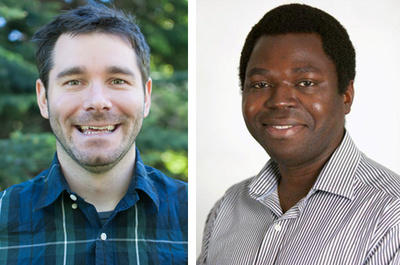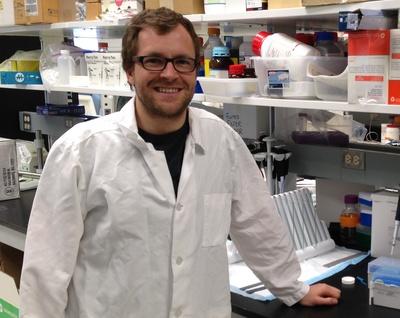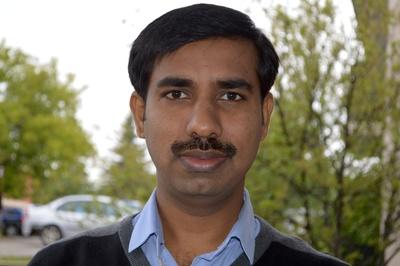Aug. 15, 2015
Five university scholars win esteemed Banting Postdoctoral Fellowships

The university's postdoctoral scholars play a key role in the research community.
Dave Brown, University of Calgary
The Government of Canada announced the recipients of the 2014 Banting Postdoctoral Fellowships on Thursday, including five University of Calgary scholars. Recipients Joseph Lemire, Chilenye Nwapi, Geoffrey Power, Channakeshava S. Umeshappa and Jing Wang are the first University of Calgary scholars in the institution’s history to receive the prestigious fellowships.
“We are tremendously proud of these five postdoctoral scholars and the recognition their work is receiving,” says President Elizabeth Cannon. “These talented young researchers exemplify just why our university is Canada’s leading next-generation university and well situated for success in our Eyes High journey of becoming one of Canada’s top five research universities by 2016.”
Ed Holder, minister of state, Science and Technology, says, "Our government is investing in developing, attracting and retaining the world's most promising young research talent to ensure Canada remains a leader in discovery and applied research.
“Today's recipients of Vanier Canada Graduate Scholarships and Banting Postdoctoral Fellowships are world-class researchers who will make the breakthrough discoveries and innovations that Canadian jobs, our economy and our quality of life depend on," Holder adds.
Postdoctoral scholars play a key role at the University of Calgary, says Ed McCauley, vice-president (research). “They challenge our faculty to consider new research directions, bring rich experiences to our community, and help us to promote discovery, creativity and innovation.”
To be awarded a Banting fellowship, worth $70,000 per year over two years, applicants must have institutional support and display excellence in academic leadership. “The leadership that Banting fellows provide is an investment in the future of the country, and of an institution. The recipients each play a leadership role in their research area,” says Naweed Syed, postdoctoral program director. “Each recipient is aligned with our institutional strategic priorities, and is supported by one of our world-class principal investigators. All of these pieces will come together to help us achieve our Eyes High goal.”
Syed is optimistic about the impact these fellowships will have on future generations of university scholars. “It excites and stirs up the whole pot of excellence,” says Syed. “The Banting fellows will raise the bar, which will lead to more funding opportunities, publications, and novel new technologies in the postdoctoral community.”

Joseph Lemire and Chilenye Nwapi
The recipients are:
- Joseph Lemire: Faculty of Science, supervised by Dr. Raymond Turner
As part of the Turner Research Group, Lemire’s research focuses on exploring the capacity of metal ions to function as antimicrobial and antibiofilm agents. His research will define the mechanistic manner with which metal ions, such as silver and copper, poison the bacterial cell. This research collaboration between members of the Biofilm Research Group at the University of Calgary will provide innovative treatment options to tackle the timely issue of antimicrobial resistant infections. Data from these studies can be used to advance our understanding of metal toxicology, environmental microbiology, and pollution remediation.
Lemire is also a recipient of an Alberta Innovates — Health Solutions fellowship, and prior to receiving the Banting Fellowship was recipient of an NSERC fellowship.
- Chilenye Nwapi: Faculty of Law, supervised by Alastair Lucas
Nwapi’s research focuses on the relationship between law, human rights and corruption in developing countries where Canadian extractive companies are operating. Nwapi addresses the risk of Canadian companies becoming implicated in human and environmental rights abuses and corruption in their overseas operations. His goal is to see how the risk can be minimized through legislation and policy and how to make the knowledge and solutions available globally.
Nwapi is also an Eyes High Postdoctoral Scholar at the University of Calgary.

Geoffrey Power
- Geoffrey Power: Faculty of Kinesiology, supervised by Dr. Walter Herzog
Power is a postdoctoral scholar working in the field of skeletal muscle physiology and mechanics, focused on evaluating how aging of skeletal muscles affects the molecular mechanisms of muscle contraction. His work will involve nano-technology approaches to measure molecular interactions, muscle physiology, medical aspects of aging, and biomechanical approaches to experimental testing.
Power is also a recipient of an Alberta Innovates — Health Solutions fellowship and an Honorary Killam fellowship.

Channakeshava S. Umeshappa
- Channakeshava S. Umeshappa: Cumming School of Medicine, supervised by Dr. Pere Santamaria
Umeshappa’s research aims to develop a nanovaccine against primary biliary cirrhosis (PBC), a common and severe autoimmune disease of the liver. State-of-the-art research facilities at the Snyder Institute will allow him to work on an innovative therapeutic platform that utilizes metal-based nanoparticles coated with autoimmune-disease-relevant peptide MHCs (pMHC) to treat autoimmunity. If pMHC-based nanovaccine proves effective in curing murine PBC, Umeshappa’s work will help develop nanovaccines to treat human PBC, and ultimately, other autoimmune diseases that affect human beings.
Umeshappa is also a recipient of an Alberta Innovates — Health Solutions fellowship.

Jing Wang
- Jing Wang: Cumming School of Medicine, supervised by Dr. Paul Kubes
Wang’s research is focused on investigating the basic mechanisms of immunity using imaging techniques. These recently developed techniques are unique in their ability to actually see how the immune system functions within the liver and other organs. Understanding how neutrophils and macrophages contribute to the initial inflammation associated with sterile, non-infectious injury, may have impact on treatment of both early inflammation as well as deviations from normal healing such as chronic scarring and autoimmunity problems.
Wang is also an Eyes High Postdoctoral Scholar, and prior to receiving the Banting Fellowship she was a recipient of the Mitacs and Dr. T. Chen Fong Fellowships.
